Tuesday, December 12, 2006
Update on Unionist Homophobia
All thirty-nine opponents to the regulations were either from the Ulster Unionist Party and the DUP. Those in favour included Sinn Fein, Alliance and SDLP. David Ervine of the Progressive Unionist Party was the only unionist to vote in support of the regulations.
The unionist argument was couched in Christian rhetoric. Caitriona Ruane of Sinn Fein noted the DUP's history of homophobia and accused the party of using homophobia for political gain.
Alex Maskey of Sinn Fein referred to Ian Paisley's various campaigns against gay rights: "For many of us, the history of the DUP — and perhaps, even more so, that of the Free Presbyterian Church — will lead many of us to believe that a strong homophobic strain runs through that strand of our society. Many of us believe that, and our belief is based on the experience of seeing many years of strong campaigns that were headed by the leader of the DUP, who is sitting on the Benches opposite."
Patricia Lewsley of the SDLP referred to the DUP as the "Discriminating as Usual Party."
Paul Berry, former-DUP golden boy, who last year was alleged to have engaged in a sex act with another male in a Belfast hotel, remained silent throughout the debate but voted with his former party-colleagues in opposing the introduction of the regulations.
This is an update of this post.
Monday, December 11, 2006
Bad Art - Michael Stone
 In the wake of Michael Stone's recent attack on Stormont, many of the news reports noted that Stone was an artist, although none mentioned how amateurish his artworks actually are.
In the wake of Michael Stone's recent attack on Stormont, many of the news reports noted that Stone was an artist, although none mentioned how amateurish his artworks actually are.The pictures I've seen display no understanding of technique, composition or ability.
Two of his dreadful paintings appeared on eBay in the last week. One, entitled ‘Kneeling Nude on a Red Background’ had a ‘buy-it-now’ price of £9,995. It wasn’t met and the item mysteriously vanished from eBay before the auction closed.
A second, untitled, nude came with a signed photo of Stone posing by its “sister painting” which is entitled ‘Coeruleum Sunrise’. The bidding started at £4,000 and the auction closed this afternoon without any interest.
These works are really bad. The reds and blacks which act as a background to the nudes, coupled with the clumsy graphic style, suggest a boy's bedroom from the 1980s. The female nudes look as if they've been badly copied from a pornographic magazine.
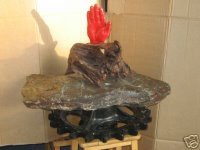 Bizarrely, the listings noted that a percentage of the sales would be donated to Relatives for Justice, a Northern Irish victims charity with offices on the Falls Road and an interest in uncovering British Army and RUC collusion in murder.
Bizarrely, the listings noted that a percentage of the sales would be donated to Relatives for Justice, a Northern Irish victims charity with offices on the Falls Road and an interest in uncovering British Army and RUC collusion in murder.However, Stone's artistic nadir has to be a sculpture, currently on eBay with a starting price of £3,500. Behold the red hand, cast from a Glaswegian loyalist as it arises from a piece of bog oak, slate and a cog wheel.
I'm not quite sure what this piece is trying to convey. Perhaps, in his delusiory state, Stone thought that the presence of the bog oak provided him with some kind of artistic credibility. Alternatively, Stone may have recently become aware that his art was rubbish and decided to go back to the day job.
We all know what an exhibition that turned out to be.
Bad Art - Republican Sinn Fein
 Today, the Belfast Telegraph printed a news story about Republican Sinn Fein’s Christmas card, complete with a picture (which I reproduce here). As you can see, the image is of Santa wielding an AK-47 rifle and uttering ‘Up the Republic’ in Irish.
Today, the Belfast Telegraph printed a news story about Republican Sinn Fein’s Christmas card, complete with a picture (which I reproduce here). As you can see, the image is of Santa wielding an AK-47 rifle and uttering ‘Up the Republic’ in Irish.As expected, hands were flung up in horror and words of condemnation were issued from the usual quarters.
However, none of the reports have mentioned that the artwork is truly awful. Isn’t there anyone in Republican Sinn Fein’s marketing department with an appreciation of art?
Illustrated cards of this standard are excusable if produced by a children’s charity. By releasing this inept and unsophisticated image, Republican Sinn Fein announces it isn’t a political organisation that should be taken seriously.
United Colours of Homophobia
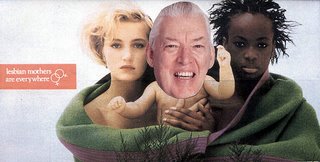 Today, the DUP and friends turned their attention to gay-baiting in an attempt to frustrate the progress of the new Sexual Orientation Regulations, which are designed to stop businesses discriminating against lesbian and gay people in the provision of goods and services.
Today, the DUP and friends turned their attention to gay-baiting in an attempt to frustrate the progress of the new Sexual Orientation Regulations, which are designed to stop businesses discriminating against lesbian and gay people in the provision of goods and services.Thirty-nine Assembly Members voted in favour of a motion condemning the British Government's plans to introduce the regulations. Thirty-nine voted against and the motion was rejected. The regulations will take effect from 1st January 2007.
Although Jeffrey Donaldson and George Dawson of the DUP led the charge against the Sexual Orientation Regulations, one can be comfortably assume that the vast majority, if not all of the other thirty-seven supporters of the motion were from within the Unionist bloc.
Unionist homophobic loathing was well illustrated during the introduction of civil partnerships for same-sex couples in 2005. The issue of whether or not to allow gay couples to use Lisburn City Council's wedding room threw unionism into such a tizzy that more than £20,000 of rate-payers' money was squandered seeking legal advice on dealing with the issue, only to find that any actions to block gays from the wedding room would be illegal.
At the time, Councillor Edwin Poots of the DUP likened homosexuality to alcoholism and drug addiction while the Ulster Unionist Ronnie Crawford said he was disgusted by gay websites that he had happened across in researching civil partnerships. How one happens across disgusting websites while researching government policy remains unclear. Perhaps, Mr Crawford strayed from the path to explore some of his own interests.
The comments by Jack McKee of the DUP demonstrate the influence of religious fundamentalism on political decision-making: "I believe that God made Adam from the dust of the ground and that he made woman from the rib of Adam and he made her as a helpmate for him. This is my personal belief and I believe it with all my life. I do not believe man came from monkeys, and all that."
DUP Councillor, Maurice Mills went a hilarious step further when he decreed that Hurricane Katrina was sent by God to punish the New Orleans' gay community since it arrived just days before the annual gay mardi gras. He's also an expert on the AIDS epidemic in Africa, noting that the "abominable and filthy practice of sodomy has resulted in the great continent of Africa being riddled with AIDS, all at great cost to the nations and innocent children." Quite.
This is what he said about the 2004 tsunami, which savaged parts of Asia: "These disasters are no coincidence, as God only honours those who honour him. I would ask why we don't see disasters like these taking place in Europe. Scripture says righteousness exalts nations. Asia is not a Christian continent."
In 2004, the DUP's Newtownabbey councillor, Arthur Templeton, was convicted of harassing a gay candidate during local government elections. Following the court case, he said he believed homosexuality was "Against God's teaching."
Examples of Templeton's behaviour are childish in the extreme. He apparently bent over in front of the man he was harassing, patted his backside and said, "Here you are, John." He also called him "queer" and offered to hold his hand while crossing the road.
Christian religious fundamentalism is so embedded within the Unionist political psyche that it's hard to see how any enlightened or progressive thinking can emerge from within it. Instead, we're transported to some weird, sepia-tinted parallel universe where everything revolves around the gospel hall and swings are padlocked on Sundays.
I'm reminded of the world conjured up by the BBC adaptation of Jeanette Winterson's 'Oranges Are Not The Only Fruit' where the reaction of evangelicals to discovering homosexuality in their midst is both chilling and comic.
Paul Berry must know something of this attitude. The former-DUP member and ardent gospel-singer, was suspended from the party in 2005 and then forced to resign after allegations surfaced that he had a sexual encounter with another man in a Belfast hotel. It transpired that Mr Berry's alleged sexual partner had arranged the whole affair as an elaborate trap in order to make a statement on DUP hypocrisy.
I wonder how Mr Berry voted today.
Monday, November 27, 2006
Moron Moments - Hain, Bell and Stone
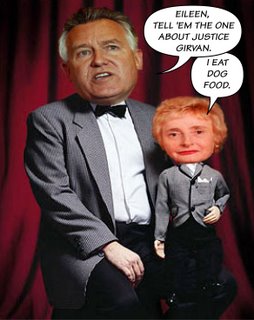 Local ventriloquist doll and Speaker of the Northern Ireland Assembly, Eileen Bell, has accomplished a feat that would have previously seemed impossible. She has ensured Ian Paisley's "No," actually means "Yes."
Local ventriloquist doll and Speaker of the Northern Ireland Assembly, Eileen Bell, has accomplished a feat that would have previously seemed impossible. She has ensured Ian Paisley's "No," actually means "Yes."Although Dr Paisley noted on Friday that he was in no position to make a nomination to the Northern Ireland Assembly, due to Sinn Fein's inaction on policing, Mrs Bell announced otherwise.
The question must now be asked: why did we never sieze upon Mrs Bell's powers of double-speak long ago?
With Mrs Bell leading the vanguard, Paisley would have said, "Yes," to Sunningdale, the Anglo-Irish Agreement and the Good Friday Agreement. "Never, never, never!" would have been transformed into "Always, always, always!" Think of the bloodshed that would have been averted.
But, Mrs Bell was merely mouthing the words of Secretary of State for Northern Ireland, Peter Hain. It didn’t matter what was said in the Assembly chamber; Hain and the Northern Ireland Office ensured it was translated through their own political spin machines, for their own preferred ends.
And just when things couldn’t get any more ludicrous, enter stage right, former British agent, Michael Stone, equipped with an array of accessories including nail bombs, an axe, a garotte and a gun.
The attack that followed was darkly comic, particularly the scenes where Michael Stone's glasses were knocked off and the female security guard held his legs up while he lay on the ground, shouting like a mad thing.
Stone's reappearance was akin to the reactivation of a long dormant sleeper or resurgent comic-book villain. The fans didn't see that one coming. It was like the return of the Cybermen to 'Doctor Who' in 1982. How we fell off our seats in astonishment.
Either his actions were fuelled by mental illness, the desire for further celebrity or he was guided, like Mrs Bell, by some sinister intelligence.
Whatever the motivation behind Stone’s inept attack, it has acted as a successful distraction from the serious problems faced by Mr Hain.
The Secretary of State must recognise that his ambition for the role of Deputy Prime Minister is threatened by Mr Justice Girvan's call for an inquiry into the circumstances surrounding the appointment of the Victims' Commissioner.
To date, there has been no serious examination of this affair by either Westminster or the London media, proving that no one over there really cares about what goes on over here.
Perhaps, now that the High Court has orderd an inquiry into the illegal actions of Mr Hain, the need for the Northern Ireland Office to produce a spectacular diversion is upon us.
Wednesday, November 22, 2006
The Ugliest Street in Belfast
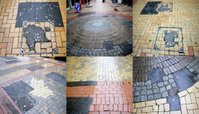 It has become a bit of a cliché to note that most people walk around cities without ever looking up at some of the architectural wonders ranged above them. I would suggest that people look down when out walking, particularly in Belfast city centre, which is home to some of the most offensive examples of street paving I have ever seen.
It has become a bit of a cliché to note that most people walk around cities without ever looking up at some of the architectural wonders ranged above them. I would suggest that people look down when out walking, particularly in Belfast city centre, which is home to some of the most offensive examples of street paving I have ever seen.Castle Lane has to be the worst. Surely, there can'’t be a single person willing to defend this paving disgrace. Take a walk along Castle Lane, from Royal Avenue to Corn Market, and you'’ll see what I mean. What was once a reasonably pleasing brick-paved lane has become a patchwork mess of mismatched stones and tarmac. Where a brick has been damaged, tarmac has filled its space. Even the manhole recesses have been filled with tarmac. In one instance, where some of the bricks in a manhole recess have been damaged, we get a sloppy mix of brick and tarmac, with one brick sporting a tarmac filled hole. Click on the photograph above to increase its size and witness this atrocity.
In one place, the words 'Castle Lane' used to be etched in the paving. Now it just says 'Lane'’ as the tarmac has obliterated the rest.
The paving disaster doesn'’t stop at Castle Lane. Look at Corn Market. What is going on? As soon as the bandstand was removed, an ugly amalgam of paving bricks was quickly thrown down. The result is a slightly sloping, many-coloured, paved mound. Didn'’t anyone think to level the surface first?
It would appear morons at the Roads Service are to blame. Since the mid-1980s, it has been Roads Service practice to replace broken flagstones with tarmac, as tarmac is cheaper than any other form of paving. They don't seem to give any consideration to aesthetics.
Just last week, I noticed a tiny square of tarmac embedded in a brick pavement, close to my home. Doubtless, this square will eventually spread like a cancerous growth and spoil the rest of the pavement. Perhaps I should follow the example of 67 year-old Gary Kelly, a Turf Lodge pensioner, who recently sat on the pavement outside his home and successfully prevented Road Service replacing the broken paving stones with tarmac.
"Tarmac is just depressing to see, " said Mr Kelly. "It is only a small matter, but it's the principle of the thing."
Sunday, November 19, 2006
Moron Moments - Party Piglets
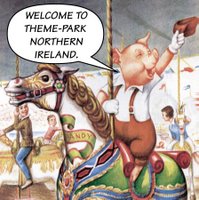 Yesterday, I saw an advert for Party Piglets and my mind flash-backed to a long-forgotten, damp evening on Victoria Street, where I once witnessed the disturbing sight of a group of morons waving and wailing from a British Army Saracen as it sped along the wet road. On recalling this moment, I felt as if a repressed abuse memory had surfaced.
Yesterday, I saw an advert for Party Piglets and my mind flash-backed to a long-forgotten, damp evening on Victoria Street, where I once witnessed the disturbing sight of a group of morons waving and wailing from a British Army Saracen as it sped along the wet road. On recalling this moment, I felt as if a repressed abuse memory had surfaced.On returning home, I checked out the Party Piglets website. Further horrors flickered into life on the computer screen. Here was a company that hired out British Army vehicles for the purpose of partying. These vehicles, which once cruised the streets, disgorging boy-faced soldiers with stern expressions and guns, now offered - according to the website - "the ultimate party experience."
In the 'Galleries' section, additional morons pose alongside Saracens, brandishing rifles and looking stupid. Local drag queen, Titti Von Tramp - not usually noted for her subtlety - is pictured astride an army jeep, legs akimbo. I think she is stimulating masturbation with a beer bottle in one picture, but I'm not entirely sure what might be going on. And if that's not enough, you can have a male stripper, dressed as an RUC man, if you so desire.
"The best craic I've had in years!" announces Kevin Connolly, editor of 'That's West Belfast' magazine on one of the website pages. Now, I'm sure I'd have heard of 'West Belfast Magazine' if it actually existed. I Googled it - and Mr Connolly - and came up blank. Surely the unscrupulous Party Piglets didn't invent it to give credence to their insensitive and crass enterprise?
Revisiting that rainy night in Victoria Street, I wondered how someone who had experienced the death of a loved one at the hands of the British Army might have felt on witnessing the drunk youngsters, shrieking hysterically from the speeding Saracen, feather boas fluttering in the slipstream.
Welcome to Theme-Park Northern Ireland. Here, every day's a party. Don't forget to pack your 'Lonely Planet' and don't mention the war.
Sunday, November 05, 2006
Awfully Awfully at Castleward Book Fair
 The Castleward Book Fair didn't advertise itself as an event where one had to pay admittance.
The Castleward Book Fair didn't advertise itself as an event where one had to pay admittance.I pointed this out to the apologetic, elderly gentleman from the National Trust who greeted me as I arrived. He was embarrassed enough to forego the usual £3.80 per person entrancee fee and instead let me in for £1.80 - the child's fare.
Although charmed by his generous gesture, I was still somewhat disgruntled at having to pay anything into an event where I was expected to buy books, especially as the 18th Century mansion was closed to the public.
Anyway, the books were cheap and in plentiful supply. Colour stickers marked the £3 bargins from the £1 bargains and I even managed to get a copy of Ladybird's classic 'Downey Duckling' for 10p. I made my way to the pay point where elderly ladies with fixed grins and cut-glass accents rifled through the flyleaves in search of prices. I contested this attempt at flyness by pointing out the blue stickers on the spines of the books, denoting the price as £1 per book. The ladies gasped in humble apology and directed me to the bookshop next door, which I was informed held similarly priced goodies.
In the bookshop, a female customer, hobbling on a crutch, was in dialogue with another woman and a man, both of whom appeared to work in the shop. The women were dressed in tweeds and seemed to have modelled their appearances on Queen Elizabeth II. They held fixed-grin expressions and spoke with the most affected upper-class accents I've ever heard. As I made a play of browsing the shelves, I strained to ascertain the geographical location of said accents, but the feat was rendered impossible as the women's voices seemed to duel with one another to see who could sounded most royal. There was no geographical source for these voices. The entire performance was couched in crude snobbery. Irony was entirely absent.
"I wonder if you would suggest some light reading for me?" the woman with the crutch asked of the other woman. Her tone suggested she was more used to giving orders to servants.
"Why, I wouldn't know what kind of books you would like," answered the female shop assistant.
"I just need some light reading to send me to sleep," whittered the customer, ignoring the subtle protest of the other woman. "As long as it doesn't have any swear words. They're everywhere these days. It makes everything simply trying."
"One can't even go to the cinema," interjected the man, similarly accented. "It's wall to wall swear words. One for effect might be acceptable, but it's just wall to wall."
"It's dreadful," lamented the woman with the crutch, her tweed shifting uncomfortably.
"Oh look, there's one you might like," relented the female shop assistant. "'Sophie's World.'" She turned the book over and made a pretence of reading the back cover. "But who is Sophie?"
"I really need some light reading for when I get up in the night," the customer said. "We've mostly got biographies and such at home and I usually lose interest after a few chapters. I just get fed up. I really need some light reading."
"There's one. Hemmingway?"
"No."
"What about Barbara Taylor Bradford? 'Voice of the Heart'?"
"No."
"Joanna Trollope?" offered the shop assistant, examining another book, a pained expression creeping into her carefully maintained mask. "'Brother and Sister?'"
"No," the reply came, delivered in a bored tone.
"Oh, there's Dirk Bogarde."
"No."
"Oh, now look at that one," came the riposte. The shop asistant reached for a volume about the British Royal Family. She opened the pages and allowed her features to relax into quiet supplication. One would swear that sunlight poured from the photographs printed within as the general mood of the exchange improved considerably.
"Now, isn't that awfully telling," she said, pointing to a photograph. "That was taken just before they split up." She turned the book over. "It's by Jennie Bond."
"Didn't they get rid of her?" asked the woman with the crutch.
"Oh, yes," the other woman giggled. "They got rid of her, didn't they?"
"Oh, yes. They got rid of her."
"Oh, look. Kate Adie!" cried the shop woman, retreiving another book. "Philip and I are terribly impressed by her. Terribly impresed. You know, I said to my daughter, 'What do you want to do when you grow up?' and she siad, 'I want Kate Adie's job.' We're terribly impressed."
"Yes," came the reply. "It's not really light reading though, is it?"
"No, perhaps not," the shop woman said, disappointed at the rejection. She looked around at the books surrounding her, a vacant expresion on her face.
"Ronnie!" she cried. "Where's Ronnie?"
Enter Ronnie stage left.
"Here he is," purred the shop woman. "I call and angels descend." She flashed a row of pointed teeth at the other woman, who absently poked a nearby box of books with her crutch.
I wondered if I should intrude and ask the woman if she would mind picking out some books for me. I relented and left the claustrophobic shop.
I got into the car and turned on the radio. Radio Ulster was playing archive audio footage of the opening of Belfast's Queen Elizabeth Bridge on 4 July 1966 by Queen Elizabeth II. The shipyard workers - explained the plum-voiced announcer - were arranged on a floating pontoon, bedecked with red, white and blue bunting. Flags waved gaily. Queen Elizabeth II "very graciously" opened the bridge. She smiled and waved at the onlookers. The crowd cheered.
Friday, November 03, 2006
Queer and Loathing in Belfast
However, I was most struck by Bennett'’s rendering of the three gay characters - although I use the word '‘gay'’ somewhat loosely, as it isn'’t mentioned in the text. Instead, we have the camp pupil Posner using the more clinical 'homosexual' - a word Bennett would probably use to describe himself.
The other homosexuals include Hector, an aging and inspirational teacher and Irwin, a younger and somewhat uncertain rookie teacher.
Hector is forced into early retirement due to his propensity for fondling the genitals of his unfazed male pupils, while transporting them on his motorbike. Irwin agrees to 'suck off' a pupil, before ending up in a wheelchair after a motorcycle ride with Hector. We'’re left to speculate whether or not Hector's hand wandered in the direction of Irwin's crotch during the motorcycle ride, which left Hector dead and Irwin paralysed, although the suggestion that improper queer fondlings lead to death and disability was clear.
The play ends with a rollcall, which details the future prospects of the pupils. They all go on to great wealth and success, except (you guessed it) Prosser, who ends up alone, his only friends being those of unspecified identity on the Internet. Oh well, at least he remembered his beloved Hector.
Recently, I saw Alan Bennett appear on TV to talk about '‘The History Boys'’. He mentioned his male partner, which surprised me, as I'’d taken Bennett to be one of those characters who skirted around the issue of his sexual identity. Perhaps the autobiographical content and success of 'The History Boys' has encouraged him to be more honest.
What worries me is that Bennett'’s own self-loathing has produced a play in which heterosexual characters flourish while gays are doomed to lives as either pederasts or lonely outsiders. More worrying is that such lazy and old-fashioned cyphers are delivered to a public who hoot with laughter and rain awards on the play.
As an aside, the public image of the gay male was further reinforced by Marie Jones and Maurice Bessman in their underwhelming play 'The Liverpool Boat' which is running at The Docker’s Club in Belfast. Thankfully, the most offending scene, in which a grotesque stereotype of a gay man was wheeled out for laughs (and they laughed uproarously) has been removed following complaints. Although painful to watch this ill-judged caricature, its setting in a working-mens club added insult to injury. One hopes, like another famous Belfast ship, 'The Liverpool Boat'’ sinks without trace.
Friday, October 06, 2006
Unionist Foot-soldiers Exit Stage Left
Michael Copeland, a former UDR man, spoke to presenter Seamus McKee about how he and his companions in terror "Did their bit for Ulster." Phrases such as 'The Province' were scattered throughout this eulogy. He spoke in a sentimental fashion about a Catholic recruit, fearful of 'service' on the streets, who said: "What am I going to do on the streets of Londonderry? How can I come out against my own community?" One would imagine that usage of the term 'Londonderry' would provide an adequate solution to that problem.
"You can almost hear the thoughts of people," gurgled Seamus McKee in a reverential tone as he described the widows and families gathered at the Balmoral Showgrounds in Belfast. His faux-plummy accent was choked with equally faux remorse.
A UDR Greenfinch was interviewed. She described her pride at serving in the UDR, noting her duties as a security searcher in Belfast during the 1970s. I recalled a story from a friend, whose baby sister had her pram searched going through those 1970s security barriers. The child's mother hoped the baby would void its bowels as the Greenfinch attempted to search its nappy.
I also remembered an occasion when, stopped by a UDR patrol, I was questioned by a pig-faced soldier who asked me my address. I told him and the answer didn't suffice. He asked for my previous address, which also didn't compute. I had lived at many addresses over the years, primarily in ethnically mixed areas. Unable to determine my religious background, the pig-faced creature grew red with fury and apoplexy. But this is a minor complaint compared to the murders, the collusion, the harassment and the rifle butts in the face suffered by others.
Back at the Balmoral Showgrounds, a commentator noted the presence of the great and good from within unionism - Reg Empey, David Trimble, Archbishop Robin Eames, Jeffrey Donaldson, David Forde, Lord Alderdyce, Ian Paisley and Ian Paisley The Next Generation.
Alasdair McDonnell from the SDLP was also there. I wondered what had brought him to this carnival of unionism. Didn't someone tell him about the long history of UDR collusion with loyalist paramilitries? Didn't he know that nineteen members of the UDR were convicted of murder? Has he ever wept into his tea at the dreadful killings of the Miami Showband?
Cue a rather magnanimous Brian Feeney, obviously wheeled on to give some sense of balance to the unfolding event. Mr Feeney wasted no time in assuring the listeners that the UDR was loathed by Catholics. He noted that members of the paramilitary Ulster Defence Association (UDA) often joined the UDR and made up 15% of the regiment between 1975 and 1976. He also reminded listeners that, up to 1980, it was perfectly legal to be in both the UDR and UDA.
Mr Feeney was swiftly cut off by Seamus McKee, who doubtless swooning in ecstasies, handed over to a commentator who described how Queen Elizabeth II had arrived, wearing a rather fetching suit and hat of purple, complete with a purple-edged umbrella, for alas, it was raining.
At this point, I felt compelled to switch on the TV to see this outfit in all its glory. There it was, resplendent in the rain with BBC Northern Ireland's Noel Thompson fawning like his aural counterpart on Radio Ulster.
The British national anthem was played. And played again. And again. Queen Elizabeth II craned her neck awkwardly to watch some helicopters fly overhead, a look of bored resignation etched on her face. She handed over The Conspicuous Gallantry Cross to the Royal Irish Regiment, paying them off in much the same way she payed off the equally abhorred RUC.
Soon after, a black limousine arrived to whisk Queen Elizabeth II back to the world of fresh air. The assembled dignitaries broke up into bewildered groups. The RIR marched up and down. The rain stabbed against the wet concrete.
Thursday, October 05, 2006
Who Talks Like That?
 Last night, BBC Northern Ireland broadcasted 'You Thought You Knew... Belfast City Hall' fronted by Sunday World journalist, Jim McDowell.
Last night, BBC Northern Ireland broadcasted 'You Thought You Knew... Belfast City Hall' fronted by Sunday World journalist, Jim McDowell.BBC Northern Ireland apparently believes Mr McDowell to be a popular and accessible front-man, as he's appeared on several recent TV shows. Perhaps the corporation considers him to represent a certain type of local, working-class personality generally absent from TV screens. Mr McDowell certainly adopts the persona with some aplomb, complete with faux-working class growl, reminiscent of the exaggerated Belfast accent one normally finds on beer commercials.
When trails for this programme aired during the week, I found myself asking the question, 'Who actually talks like that?' I was heartened to hear Gerry Anderson say the same thing on BBC Radio Ulster yesterday as he humourously mocked McDowell's less than dulcet tones.
The programme itself presented a rather superficial overview of the (mostly unionist) history of Belfast City Hall. Mr McDowell swaggered around the marble corridors like an uncouth dolt, sounding more and more like Honey Monster as the programme continued. Even Andersonstown News editor, Mairtin O'Muilleoir seemed infected by the monster-speak, as he started talking in a similar accent when McDowell descended to interview him. The DUP's Sammy Wilson, sporting the usual bad haircut, appeared like some king spide dispensing wisdom from Robinson's Bar, circa 1979.
The entire display created a kind of vapid smokescreen which seemed designed to lull the viewers into a false sense of camaraderie; one where we could laugh along with city fathers without reference to sectarian politics, rest our weary elbows on the rough-hewn table on which the Ulster Covenant was signed and consider a future of Catholic mayors and gay weddings. Sure, weren't we all there? And wasn't it a laugh?
'You Thought You Knew... Belfast City Hall' was like flicking through a rather insubstantial, glossy magazine. It gave the vague impression of being part of a conspiracy designed to fool a generation into believing there is no such thing as history, with Mr McDowell as its mawkish poster-boy.
Tuesday, October 03, 2006
Money Grabbing Loyalists Strike Again
It would appear that this UDA unit wishes to disband and needs the money to help it on its way to becoming a community development organisation. It notes that the £8.5 million could create 74 jobs.
One imagines that there must be 74 members of the South East Antrim Brigade of the UDA. Most community development organisations rattle along with a mere handful of staff members.
Tommy Kirkham, a spokesman for 'Beyond Conflict' (presumably another UDA-adjunct) which backs the proposal, stated he believes the money could bring an end to loyalist paramilitary activity in South Antrim.
Reasons as to why the South East Antrim Brigade of the UDA can't just stop its campaign without having money thrown at it remain unclear.
Mr Kirkham's group is presenting a plan of action for government consideration, but notes that the proposal is not a prerequisite for ending paramilitary activity. This tactic is generally referred to as a bribe.
Meanwhile, the government has just withdrawn funding from Belfast's Rape Crisis Centre, citing failure to meet government accounting requirements.
Perhaps, like the South East Antrim Brigade of the UDA, the Rape Crisis Centre should consider engaging in killing people and drug-dealing as a way to secure further government funding and a massively inflated staff complement.
Thursday, September 21, 2006
Good and Bad Loyalists

Not satisfied with all that money thrown at them by the British Government, those irksome loyalists have decided to threaten the safety of senior Irish diplomat, Aine DeBaroid.
The police noted they believed the threats to be credible and Ms DeBaroid, who was engaged in outreach work with loyalist communities in Belfast, was quickly transported to Dublin.
Frankie Gallagher from the UDA-linked Ulster Political Research Group said: "In East Belfast we never took any money to get any resources in and yet we had a fantastic relationship with Aine, where she came and helped us in an advisory capacity."
Last night, during the BBC's ten o'clock news bulletin, newsreader Mark Carruthers noted that the threats came from 'dissident' loyalists and that the other (presumably nice) loyalists wanted Ms DeBaroid to come back to Belfast.
Since no loyalist groups are currently on ceasefire, one wonders who these '‘dissident'’ loyalists might be. It would appear that BBC Northern Ireland, adopting the role of apologist for government policy, has created this 'dissident' terminology to help define good loyalist from bad.
Earlier this week, The British Government announced it would give £135,000 to loyalist areas to enable conflict transformation. In June of this year, the British Government announced that £33million had been earmarked for loyalist areas.
Information on previous British Government funding to loyalists, in the shape of arms and intelligence to support campaigns against Catholics and Irish nationalists, is unavailable.
Last year, a study by Deliotte for the Department of Social Development found that Catholics are much more likely to live in areas of weak community infrastructure than Protestants.
Other research, conducted in 2005 by PricewaterhouseCoopers, disproved the claim that Protestants are less likely than Catholics to get Union Peace II funding to build up community infrastructure. Over half the money spent under this heading went to people in Protestant areas. The Department of Finance and Personnel regards the research report as internal and has not published it.
Details of both these reports can be found at The Northern Ireland Council for Voluntary Action (NICVA) website.
Requests for copies of any research undertaken by the Ulster Political Research Group will be met with blank stares.
Thursday, September 14, 2006
Moron Moments - Ian Paisley Jnr
 Democratic Unionist Party assembly member, Ian Paisley Jnr continued his campaign of sectarian foolishness today when, in a statement to the BBC, he claimed Catholics in north Antrim had been attacking their own homes to make it look like Protestants were to blame.
Democratic Unionist Party assembly member, Ian Paisley Jnr continued his campaign of sectarian foolishness today when, in a statement to the BBC, he claimed Catholics in north Antrim had been attacking their own homes to make it look like Protestants were to blame.Mr Paisley Jnr also remarked that a recent paint bomb attack on the long-suffering Harryville Catholic Church in Ballymena "appears to be the work of republicans".
His paranoid rant continued: "This self-imposed attack is evidence that a considerable amount of the attacks recently carried out in north Antrim are not only self-inflicted by republicans but are part of an orchestrated effort by republicans to stir up sectarian activity to discredit the local unionist community."
One would imagine that the local unionist community, led by Mr Paisley Jnr, is quite capable of discrediting itself with such blather, rather than expect republicans to help them along. Also, Mr Paisley Jnr's methods of ascertaining "the work of republicans" in this context remains unclear. Did the colour of the paint give these alleged rogues away?
Local police district commander, Superintendent Terry Shevlin said: "I wouldn't say for one moment that those people targeted are perpetrators."
Tuesday, September 12, 2006
Well, We Brought Ours!
 Last Sunday, I took advantage of European Heritage Open Day 2006 and went off to visit some of the north's greatest icons of British Imperialism.
Last Sunday, I took advantage of European Heritage Open Day 2006 and went off to visit some of the north's greatest icons of British Imperialism.The first stop was HMS Caroline, moored off Alexandra Dock in Belfast.
According to the brochure, HMS Caroline, a Royal Naval light cruiser, was launched at Birkenhead in 1914. It is now the sole survivor, worldwide, from the Battle of Jutland. Still in commission, the ship came to Belfast in 1924 to serve as headquarters for the Royal Naval Reserve in the six counties (the brochure says 'The Province' here). Our guide explained that the British Army recently occupied the ship and used the towering crow's nest as a watchtower to spy on the colonised people of Belfast. Everywhere, dull paint peeled from the hull, revealing spreading rust. The Union Jack hung limp from the ship's bow.
Next on the agenda was the former Harland and Wolff Headquarters on Queen's Road. It's a fine, three storey sandstone building, dating from 1919, although it has witnessed better days. The expansive interiors, containing the drawing offices, were in a sorry state of disrepair. According to a woman from the Titanic Society, surveyors have been examining the viability of restoring the building, although no plans exist to develop such an undertaking. The Titanic Society wants the space to be turned into a library. Other unnamed individuals want to see a hotel here. In its glory days, the building and its surrounding shipyards, stood as a symbol of Unionist might and anti-Catholic prejudice. Its ruination illustrates the current state of that former monolith.
After a trip to the rarely-open Friar's Bush Cemetery, I made for Hillsborough to investigate Hillsborough Castle. This 18th Century mansion was the residence of former colonial overlords and, since 1972, has been the home of a long list of British secretaries of state.
On entering, a rather fey footman gathered the crowds around him, and announced that he might sing us an aria while we assembled ourselves in the hallway. An elderly couple, standing directly in front of me, began speaking to the footman about the previous night's 'Proms in the Park' at Belfast City Hall. The conversation went something like this:
Old Man: We had plenty of arias last night at City Hall.
Footman: Oh, was it good?
Old Woman: It was very good, and the weather was great.
Footman: Of course, we're not allowed to take our flags down there.
Old Woman (defiantly): Well, we brought ours!
Footman: Good for you.
The dialogue was delivered with the kind of casual arrogance which assumed everyone in the room shared the same opinion.
We were ushered through several other rooms, all splendid with riches and treaures. The flag-waving pensioner and her associates cooed and bleated as guides revealed information about visiting royalty, displayed Queen Elizabeth's gowns - as designed by Norman Hartnell - and opened autograph books to display the signatures of Prince Charles, George Bush and Colin Powell. The old couple touched the seat where Queen Elizabeth once sat, as if expecting an amorphous exchange of energy to flood through their flabby frames.
The dining room glittered with expensive tableware, Tyrone crystal, elaborate menus and royal portraits. It was easy to imagine the colonial governors and their royal masters drink and make merry while their armed foot-soldiers wreaked havoc on Belfast's streets.
A further room demonstrated, via an accompanying photograph, the scene where Tony Blair, George Bush, Condaleeza Rice and others plotted the destruction of Iraq during their visit here on April 2003. The old woman mewed and made doe-eyes at the scene. There were no photographs of those who demonstrated outside.
The world of fresh air was never so welcome.
Welcome to the Great Wee Azoo
 Many years ago, somewhere between the Age of Internment and the Age of the Internet, Belfast City Councillor and Ulster Unionist, Jim Rogers was filmed by local TV at Belfast Zoo.
Many years ago, somewhere between the Age of Internment and the Age of the Internet, Belfast City Councillor and Ulster Unionist, Jim Rogers was filmed by local TV at Belfast Zoo.Mr Rogers was complaining - as he often does - about some crisis at the zoo. I can't actually remember what he was prattling about, although I think it may have had something to do with a proposal to close the zoo.
Red-faced and indignant, Mr Rogers protested against the proposal. He couldn't understand why anyone would want to take such action.
"This is a great wee azoo!" he exclaimed.
Such was his fury, that Mr Rogers repeated this phrase several times, turning a serious issue into one of weird comedy. What was this 'Azoo' he spoke of?
After some thought, I reckoned this 'Great Wee Azoo' must be something akin to 'Our Wee Country', 'The Province' or - and I shudder to echo the words - 'Norn Iron'. These phrases have often been uttered by Jim Rogers and his Unionist friends, primarily to legitimise the Northern Irish state as a glorious wonderland best viewed through Brookeborough's rose-tinted spectacles.
Some of these phrases are simply trite. 'Our Wee Country' is particularly sick-making. It's not unsurprising to find it used as the name of a Northern Ireland Football Club website. Others, such as 'The Province' are stupid and inaccurate. The province of Ulster has nine counties, six of which reside within the Northern Irish state. 'Northern Ireland' and 'Ulster' are not the same thing. But try telling that to the broadcast media - particularly the BBC.
So welcome, one and all to 'The Great Wee Azoo'. Please don't feed the animals and leave your rose-tinted spectacles at home.

